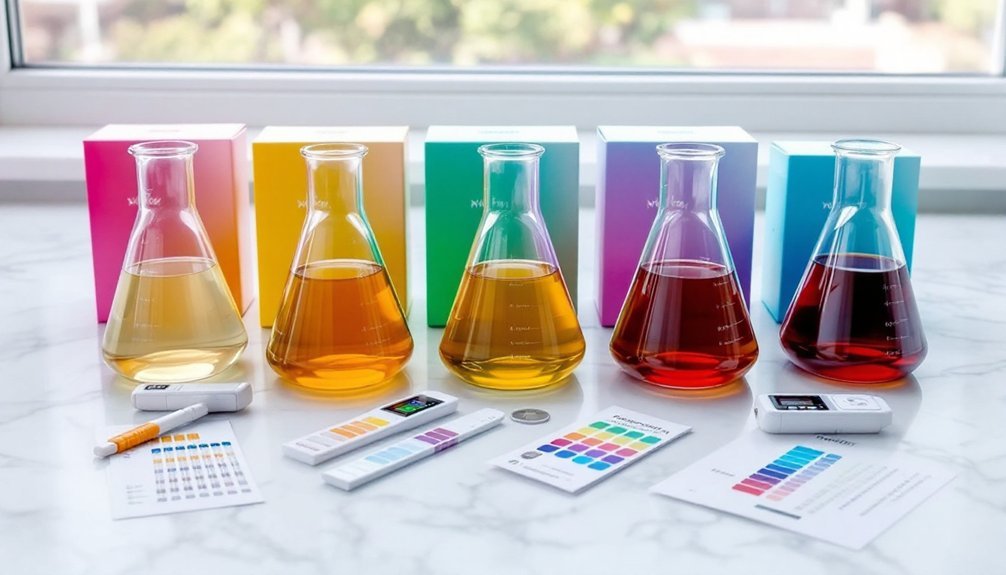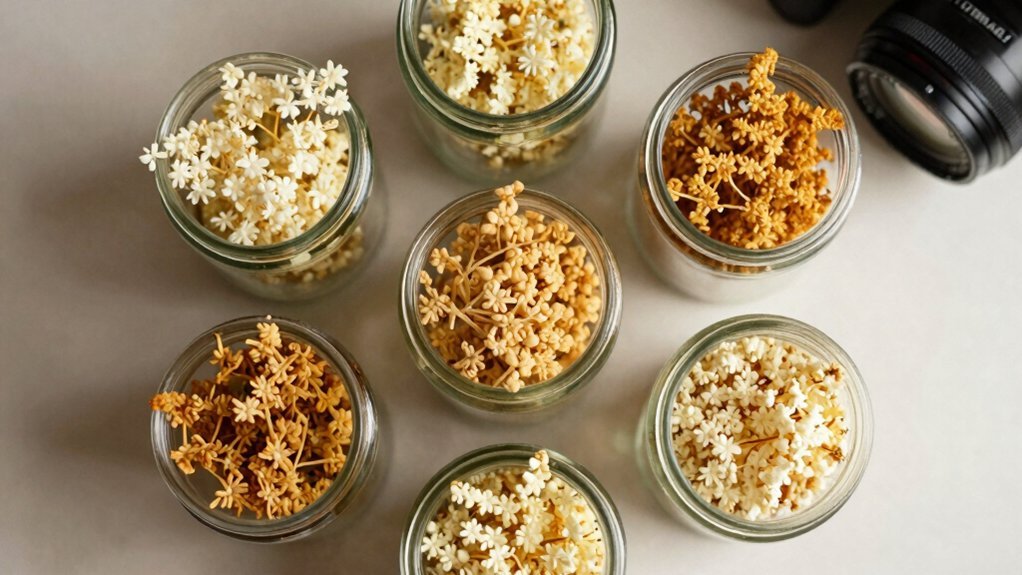You'll find that choosing the right tea oxidation test kit can make or break your professional tea assessment process. While many options crowd the market, only a select few deliver the precision and reliability needed for accurate results. From measuring heavy metals to analyzing pH levels, these top five kits have proven themselves invaluable for both commercial operations and serious enthusiasts. Let's explore which tools will best serve your quality control needs in 2025.
Lead Iron Copper and Mercury Home Water Test Kit for Well & Drinking Water
While designed for testing oxidation levels in tea, this thorough test kit also serves as an essential tool for homeowners concerned about heavy metal contamination in their drinking water. You'll get accurate results for lead, iron, copper, and mercury in under 15 minutes, meeting EPA standards.
The kit's highly sensitive strips detect metals in well, tap, or filtered water, providing individual readings rather than combined results. You're backed by EPA experts with 30+ years of experience, who'll help with any testing questions. Just note that there's only one lead test included, and you'll need to let water sit before mercury testing to avoid chlorine interference.
Best For: Homeowners and well-water users who want to quickly test their drinking water for common heavy metal contaminants using EPA-standard testing methods.
Pros:
- Fast results in under 15 minutes with easy-to-follow instructions
- Backed by EPA experts with dedicated customer support
- Tests individual metals separately rather than providing combined results
Cons:
- Only includes one lead test while multiple tests are provided for other metals
- Chlorine in tap water can interfere with mercury testing results
- Some users report inconsistent results, particularly with coliform testing
JNW Direct Water Hardness Test Kit (150 Strips)
For homeowners seeking reliable water quality monitoring, the JNW Direct Water Hardness Test Kit equips you with 150 test strips and thorough testing capabilities. You'll find them useful for multiple water sources, including faucets, wells, and aquariums.
While the kit's simple dip-and-compare method offers quick results for various applications like laundry and pool maintenance, you should note mixed accuracy reports. Some users report inconsistencies between these strips and liquid tests. Though you'll get value from the included eBook and abundance of strips, consider the potential accuracy trade-offs before making your choice. The kit's versatility shines in tracking water softener efficiency, despite some durability concerns.
Best For: Homeowners and DIY enthusiasts who need frequent water hardness monitoring across multiple water sources and want an affordable, easy-to-use testing solution.
Pros:
- Includes 150 test strips providing excellent quantity for frequent testing
- Simple dip-and-compare method delivers quick results
- Versatile application for multiple water sources including faucets, wells, and aquariums
Cons:
- Mixed reports about accuracy compared to liquid tests
- Some users report issues with strip durability and fragility
- Inconsistent readings may require verification with other testing methods
4-in-1 Digital pH/ORP/H2/Temperature Meter with ATC
The 4-in-1 Digital Meter stands out as an essential tool for tea enthusiasts and professionals who need precise measurements of pH, ORP, H2, and temperature levels. You'll appreciate its high accuracy with 0.01 pH resolution and IP67 waterproof rating, guaranteeing reliable readings during your tea oxidation tests.
While it comes pre-calibrated, you'll want to watch instructional videos for proper calibration, as the documentation can be unclear. The meter's automatic temperature compensation helps maintain accuracy across different temperatures, though you'll need to let it stabilize before taking readings. For best results, invest in calibration solutions and maintain regular calibration schedules to guarantee consistent measurements of your tea samples.
Best For: Tea enthusiasts, water quality professionals, and hobbyists who need precise measurements of multiple water parameters and are willing to invest time in proper calibration and maintenance.
Pros:
- Comprehensive 4-in-1 functionality measuring pH, ORP, H2, and temperature with high accuracy
- Durable IP67 waterproof construction suitable for various testing environments
- Features automatic temperature compensation for consistent readings across different temperatures
Cons:
- Poor documentation and unclear calibration instructions require users to seek additional resources
- Requires time for temperature stabilization before obtaining accurate readings
- Some users report inconsistent readings and reliability issues despite proper calibration
Liberty Gold Standard Water Testing Strips (121-Piece Kit)
Thorough water quality monitoring becomes hassle-free with Liberty Gold Standard's 121-piece testing kit, ideal for homeowners who want professional-grade water analysis at their fingertips. Each strip tests for 16 vital parameters, including lead, pH, heavy metals, and hardness levels.
While you'll appreciate the kit's extensive testing capabilities and easy-to-read results, be aware that some users have reported discrepancies in alkalinity and hardness readings compared to lab tests. The strips excel at measuring chlorine levels and basic water safety parameters, but you shouldn't rely solely on them for critical assessments. With 120 strips sealed for longevity and backed by a satisfaction guarantee, you're getting good value for regular water monitoring needs.
Best For: Home and well-water owners seeking regular, comprehensive water quality monitoring with an affordable DIY testing solution.
Pros:
- Comprehensive 16-parameter testing capability in each strip, including essential metrics like lead, pH, and chlorine
- Easy-to-use design with quick, clear readings and 120 strips provide excellent value for regular testing
- Backed by 100% satisfaction guarantee with available refunds
Cons:
- Some accuracy issues reported, particularly with alkalinity and hardness measurements
- Not reliable enough to replace professional lab testing for critical water quality assessments
- Limited shelf life once the bottle is opened, requiring careful storage and timely use
Heavy Metal Test Kit for Humans (5 Pack At-Home Urine Test)
Professional healthcare providers and individuals concerned about toxic metal exposure will find Osumex's Heavy Metal Test Kit invaluable for quick, accurate screening. You'll get results in minutes for five key metals: aluminum, arsenic, cadmium, lead, and mercury, measured in parts per million.
This cost-effective alternative to lab testing lets you check urine, water, food, and soil samples from anywhere. The kit's straightforward instructions make it easy for first-time users to get reliable results. With over a decade of trusted use by healthcare professionals and universities, you're getting lab-quality testing without the wait times or expensive fees.
Best For: Healthcare professionals, environmentally conscious individuals, and anyone concerned about heavy metal exposure who wants quick, reliable at-home testing capabilities.
Pros:
- Provides rapid results for five different heavy metals without expensive lab fees
- Versatile testing capabilities for multiple sample types (urine, water, food, soil)
- Easy to use with clear instructions, making it accessible for first-time users
Cons:
- May require multiple tests for ongoing monitoring, increasing long-term costs
- Limited to testing only five specific metals unless customized
- Results may need professional interpretation for proper health assessment
Factors to Consider When Choosing a Tea Oxidation Test Kit
When you're shopping for a tea oxidation test kit, you'll want to evaluate key features like measurement accuracy, user-friendliness, and how long each test takes to complete. Look for kits that can perform multiple tests per package while maintaining consistent results across different tea varieties. The cost per test should align with your budget, but don't sacrifice accuracy and reliability just to save money.
Measurement Range and Accuracy
Understanding a test kit's measurement range and accuracy proves vital for reliable tea oxidation assessment. You'll want to look for kits that offer a complete 0-100% measurement range to evaluate all processing stages effectively. The best kits deliver results within ±1% accuracy, guaranteeing you'll get consistent, trustworthy readings.
Many professional-grade kits use colorimetric technology, where color intensity changes correspond directly to oxidation levels. This feature makes readings more precise and easier to interpret. Don't forget to check if your kit includes calibration standards – they're essential for maintaining accuracy over time. You'll also need to properly store and maintain your test strips or reagents to preserve their effectiveness. Regular calibration and careful storage will help guarantee your measurements stay reliable throughout the kit's lifespan.
Ease of Use
Selecting a user-friendly tea oxidation test kit can greatly streamline your testing process and reduce potential errors. You'll want to look for kits that provide detailed yet simple instructions, making it easy to understand each step, especially if you're new to tea oxidation testing.
Focus on kits that use straightforward testing methods, like dip strips or color-matching charts, which don't require complex procedures. Make sure your chosen kit includes all essential components and calibration materials right out of the box, so you won't need to purchase additional items. The best kits deliver results within minutes and feature intuitive designs that make regular testing effortless. Consider portable options if you'll be testing in different locations. These user-friendly features will help you maintain consistent and accurate results while saving valuable time.
Testing Time Requirements
Time investment plays an essential role in choosing the right tea oxidation test kit for your needs. You'll find significant variations in testing duration across different products, from quick-result kits to thorough laboratory methods.
If you're looking for rapid results, consider the newer testing kits that deliver readings in 5-15 minutes. These are ideal when you need quick assessments during tea production or quality control processes. However, if you require detailed analysis, be prepared for traditional laboratory methods that can take 24 hours or longer.
Remember that your choice shouldn't be based solely on speed. Consider how the testing time balances with accuracy and reliability. Complex tea samples may require longer processing times, so it's vital to match the kit's capabilities with your specific testing requirements and time constraints.
Multiple Test Capabilities
While choosing a tea oxidation test kit, you'll want one that offers broad testing capabilities beyond basic oxidation measurement. Look for kits that can analyze multiple parameters, including pH levels, dissolved oxygen content, and oxidation-reduction potential (ORP). These thorough measurements will give you a complete picture of your tea's quality and oxidation status.
You'll benefit most from kits that combine both visual and quantitative assessment methods, as this dual approach helps you understand how oxidation levels affect flavor profiles. Make sure your chosen kit includes enough test strips or reagents for repeated testing over time. Don't forget to check that the kit provides clear calibration guidelines and instructions – this guarantees you'll get accurate, reliable results every time you test your tea samples.
Cost Per Test Value
Savvy tea enthusiasts understand that the true value of a test kit lies in its cost per test, not just the initial price tag. To determine the best value, you'll need to divide the kit's total price by the number of tests it provides.
While some kits may seem expensive upfront, they often prove more economical in the long run if they include more tests or deliver superior accuracy. You'll want to look for bulk purchasing options, as many manufacturers offer significant discounts when you buy multiple units. Don't forget to factor in additional expenses like calibration solutions or supplementary equipment that might be necessary for accurate testing. By carefully evaluating these cost factors, you can select a kit that offers the best balance between quality and affordability for your testing needs.
Storage and Shelf Life
Proper storage and shelf life greatly impact the reliability of tea oxidation test kits, making these factors essential considerations before your purchase.
You'll need to store your test kit in a cool, dry place away from direct sunlight to maintain its accuracy. Most kits remain viable for 1-3 years, but you should always check the expiration date before testing to avoid unreliable results. Some manufacturers' kits require refrigeration, especially those containing organic reagents or sensitive chemicals.
Don't open the original packaging until you're ready to use the kit, as exposure to moisture and contaminants can compromise its effectiveness. When you're comparing different options, look for kits with clear storage instructions and longer shelf lives to guarantee you'll get the most value from your investment.
Equipment Durability Standards
Three critical durability standards determine the longevity and reliability of your tea oxidation test kit. First, you'll want a kit that's built with non-corrosive, impact-resistant materials that can withstand accidental drops and regular handling. Second, make sure your kit offers protection against moisture and temperature fluctuations, as these environmental factors can greatly affect testing accuracy.
When evaluating durability, look for manufacturers that provide extensive warranties – this reflects their confidence in the product's construction. You'll also want clear calibration and maintenance guidelines to keep your equipment performing at its best over time. Choose a kit with a practical design that's easy to transport and store, as poor handling during movement can compromise its integrity. These standards aren't just about physical toughness; they're essential for maintaining consistent, professional-grade results.
Frequently Asked Questions
How Often Should I Calibrate My Tea Oxidation Test Kit?
You'll want to calibrate your tea oxidation test kit every three months for regular use, or before each major testing session. If you're testing daily, calibrate monthly to guarantee you're getting accurate readings.
Can Tea Oxidation Test Kits Detect Artificial Colorings in Tea?
You can't rely on standard tea oxidation test kits to detect artificial colorings. They're specifically designed to measure natural oxidation levels in tea leaves, not synthetic additives. You'll need specialized food dye tests instead.
What's the Shelf Life of Unused Tea Oxidation Testing Strips?
You'll typically get 18-24 months of shelf life from unused tea oxidation strips if you store them properly. Keep them in their original container, away from heat and moisture, to maintain accuracy.
Do Temperature Fluctuations Affect the Accuracy of Oxidation Readings?
Yes, temperature fluctuations can affect your oxidation readings considerably. You'll get the most accurate results when you test at a consistent temperature, ideally between 68-77°F (20-25°C) for most standard test strips.
Can These Kits Measure Oxidation Levels in Cold-Brewed Tea?
You'll find that most oxidation test kits work effectively with cold-brewed tea, but you should let your sample reach room temperature before testing to guarantee the most accurate and consistent readings.





Leave a Reply